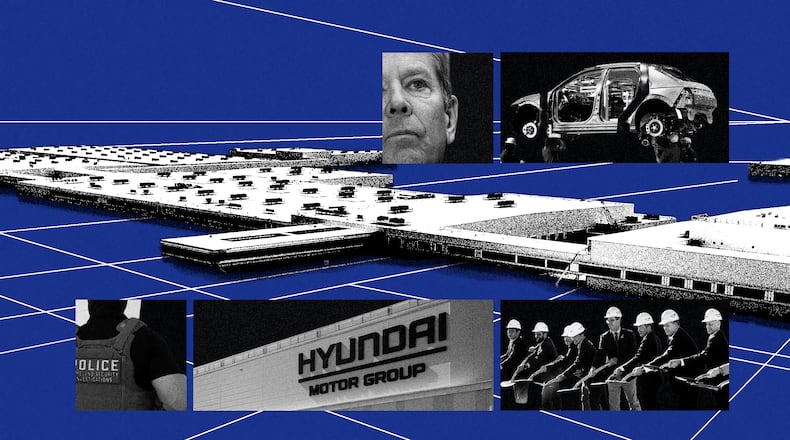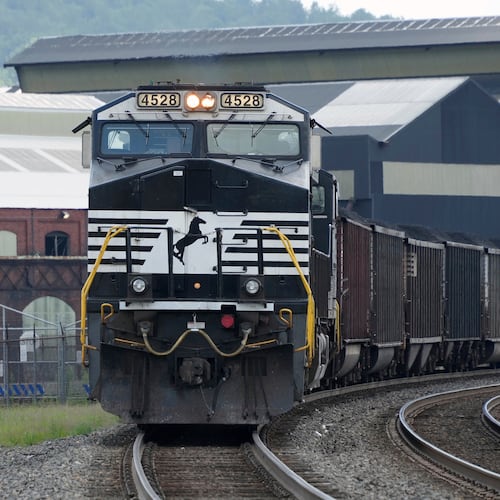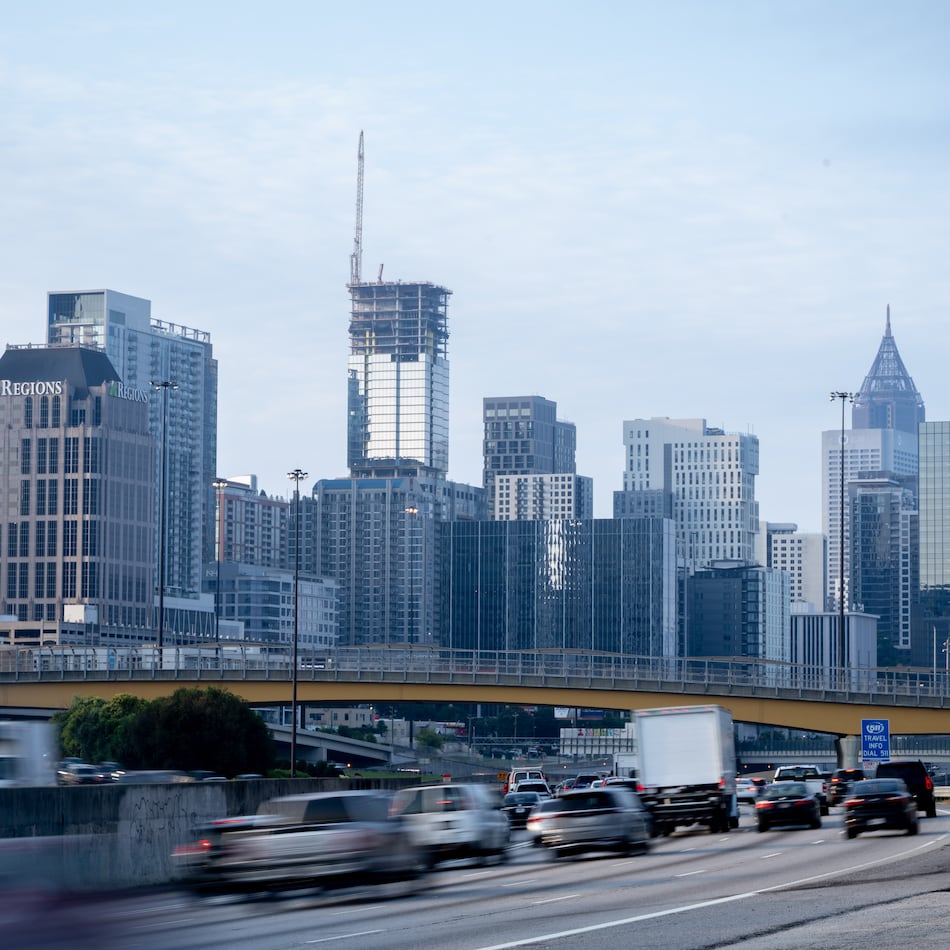NEW YORK — Hyundai Motor Co.’s top executives spent two hours last month regaling international investors on how the automaker’s innovation will shape the future of transportation around the globe.
It took less than a minute before Georgia was mentioned, highlighting how the Korean automaker has planted its growth plans in the Peach State.
That’s all because of the automaker’s enormous electric vehicle factory it calls the Metaplant near Savannah, which opened a year ago and has become Hyundai’s engine for expanding in North America.
As the Bryan County factory celebrates its anniversary, it also acts as a prelude of what’s to come for Georgia as the auto giant accelerates its investment plans.
Credit: Courtesy of HMGMA
Credit: Courtesy of HMGMA
“When the first vehicle rolled off our line one year ago, it marked more than Hyundai’s commitment to American manufacturing,” Hyundai Motor Group Metaplant America, the subsidiary in charge of the Georgia factory’s operations, said in an email to The Atlanta Journal-Constitution. “It was a promise to Coastal Georgia that we would be a partner in shared prosperity for generations to come.”
From the New York stage on Sept. 18, Hyundai CEO José Muñoz announced a $2.7 billion expansion to its Metaplant. Hyundai plans to hire 3,000 more workers in Georgia and increase production to 500,000 units annually at the 16-million-square-foot factory by 2028.
The announcement came about two weeks after a high-profile immigration raid at the campus’ battery factory, which is currently under construction. The operation primarily resulted in high-skilled Korean nationals being detained over visa issues, triggering an international firestorm.
Hyundai leaders, while frustrated by the raid, said it won’t deter their ambitious investment plans to expand stateside. The Metaplant’s success is a lynchpin in that effort.
“This isn’t just growth. It is a strategic, sustainable expansion in the world’s most important automotive market (the U.S.),” Muñoz told investors at The Shed in Manhattan. “Among all regions, North America stands out as our largest and most strategically important.”
Credit: AP
Credit: AP
Muñoz said he expects the Metaplant to eventually assemble 10 different EV and hybrid platforms, becoming Hyundai’s home base for alternative powertrains. Those plans include a midsize pickup truck and a commercial vehicle line. Models will encompass Hyundai vehicles alongside its subsidiaries Kia and Genesis, according to Chris Susock, chief manufacturing officer over Hyundai’s American factories.
Credit: Courtesy of Hyundai Motor Co.
Credit: Courtesy of Hyundai Motor Co.
Hyundai’s investment in EVs and hybrids runs counter to many of its peers as federal policies and regulations shift gears amid presidential administration changes. President Donald Trump has rolled back tax credits and incentives for EVs and clean energy projects, which is expected to slow the sector’s growth.
Kevin Ketels, an assistant professor of global supply chain management at Wayne State University in Detroit, said Hyundai officials clearly see an opportunity to capture America’s EV and hybrid market.
“They’re doubling down when other companies are pulling back,” Ketels said. “They want to be ahead of the curve on this one by increasing those (EV and hybrid) investments, which I think is good for Georgia.”
‘In record time’
First announced in 2022, the Metaplant was initially proposed as a $5.5 billion project, which ranked as the largest in Georgia history.
The numbers would only get higher from there.
Months later, Korean battery giant LG Energy Solution provided even more juice by announcing a joint battery plant with Hyundai on the Metaplant site, growing that figure to $7.6 billion. Hyundai also announced a $5 billion joint venture with SK On to build a battery factory in Bartow County, totaling $12.6 billion of investment in Georgia.
To recruit Hyundai to Georgia, state and local officials offered an equally unprecedented incentive package worth about $2 billion.
Every six months, Hyundai has to submit a compliance report to the Georgia Department of Community Affairs to showcase investment and job creation updates. As of the end of June, Hyundai reported it hired 3,129 workers and invested $5.3 billion so far, according to reports obtained by the AJC.
Korean companies like Hyundai have built a reputation for building things at lightning speed. During construction, dozens of tower cranes populated Hyundai’s 3,000-acre site along I-16.
Within two years of the project’s announcement, Hyundai transformed the barren land that looked like the surface of the moon into a fully operational assembly plant.
Credit: Stephen B. Morton for The Atlanta Journal Constitution
Credit: Stephen B. Morton for The Atlanta Journal Constitution
“We learned early on when we started working on the site that there’s only one speed with Hyundai — fast,” said Trip Tollison, the Savannah area’s top economic development official.
Hyundai’s speed has forced local officials to try to keep up. So far, workforce development groups are active in eight counties surrounding Savannah to train workers for advanced manufacturing careers like those found at the Metaplant.
Hyundai calls its workers “MetaPros,” adding that they “have exceeded every expectation, transforming from trainees into world-class automotive professionals in record time.”
Staying flexible
A lot has changed in the year since Hyundai started Peach State production.
Trump won reelection and started revoking what he called the “EV mandate,” gutting incentives for the sector in favor of gas-powered cars. EV sales, despite steadily growing, were lagging industry projections and prompting some automakers to pivot.
Credit: HMGMA
Credit: HMGMA
Hyundai has altered its plans as well to focus more on hybrid models, but its growth efforts still center on expanding EVs and alternative engine models.
“There’s always going to be changes in administrations and changes in regulatory (environments),” said Stephanie Valdez Streaty, director of industry insights at Cox Automotive. “With Hyundai, what they’re doing is they have a plan and they’re moving forward with it.”
Hyundai ranked fourth among automakers in this year’s third quarter for new EV sales, according to Cox Automotive data. Hyundai’s EV sales, however, grew at the fastest rate among its peers.
September’s EV sales figures totaled 147,716 units, a 44% increase from a year ago. Valdez-Streaty credited this primarily to congressional Republicans sunsetting EV tax credits worth up to $7,500 at the end of September, prompting a consumer rush to beat the deadline.
Hybrids, in comparison, have increased sales activity by more than 50% over a year ago, which Hyundai officials have noticed. Muñoz told the AJC last month hybrids could comprise half the Metaplant’s output by 2030.
“You will see a good balance. I would say roughly 50-50 between hybrids and EVs,” Muñoz said. “Our strength is the flexibility and the ability to produce different types of vehicles in the same factory.”
Credit: Courtesy of Hyundai Motor Co.
Credit: Courtesy of Hyundai Motor Co.
Susock told Savannah leaders during an Oct. 8 meeting that EV demand isn’t going to go away. A short-term retreat by other automakers only serves to benefit Hyundai’s long-term strategy centered on Georgia production.
“We believe that other competitors, as things start softening up, will get out of that (EV) market,” Susock said. “We believe that will leave a vacuum to fill, and we think we’re in position to fill that vacuum … That really bodes well for our operation here in Bryan County.”
Cox Enterprises, owner of the AJC, also owns Cox Automotive.
— Staff writer Adam Van Brimmer contributed to this report.
About the Author
Keep Reading
The Latest
Featured










